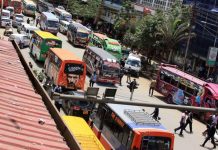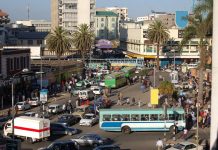The transport and business sectors in central Kenya are slowly slipping back into the grip of vicious gangs who threaten, maim and kill those who oppose them.
At the bus terminus in Nyeri town, keen observers can see the gang members spring into action as soon as county government officials close for the day at 5pm.
These individuals extort a loading charge that matatu operators have little alternative but to pay, or else they would be courting bodily harm.
And in the nearby Soko Mjinga market, The Standard encountered a group of youth arguing with traders over a ‘small’ fee they are supposed to part with on a daily basis.
Although Nyeri has been the region’s administrative centre for years, security agencies appear unwilling to tackle this emerging menace.
The situation is the same across the region, with organised gangs making a killing extorting matatu operators and business people who are suffering in silence.
Circumvent laws
What is happening evokes memories of the dreadful days when Mungiki sect members ran amok and demanded cash from traders with reckless abandon as police watched helplessly from the sidelines.
After weeks of investigation, The Standard can reveal that there are active gangs in Nyeri, Kirinyaga, Murang’a and Kiambu counties.
Although the police and country administrators describe the criminal activity as isolated, the victims have a different story to tell.
They speak only after being assured that their identities will be hidden, for fear of reprisals from ruthless gang members who are ready to avenge any form of betrayal.
Public transport in Nyeri town has been targeted by criminals seeking to circumvent laws that seek to ensure sanity in the sector.
Gang members, who work in pairs and operate after 6pm, eye public service vehicles plying routes from the central business district to residential areas.
Passengers who live in Ruringu, Skuta, Muthinga, Muruguru and Gatitu as well as Othaya and Mukurweini towns rarely notice them or the unusual manner in which they operate.
Operating under the guise of avoiding traffic congestion in the matatu terminus, some out-of-town Saccos create their own pick-up points outside the designated area.
The gang moves in after the Saccos’ offices, which manage operations, close for the day.The Standard observed that matatu operators, some affiliated to the out-of-town Saccos and looking to make extra cash, would pay Sh50 to the gang, which would then allow them to ply the Nyeri-Ruringu-Skuta route.
“We are used to giving the money every evening after the county workers leave their station at 5pm. You cannot dare to refuse to part with Sh50 since you will be blacklisted or physically assaulted,” said one driver.
James Waithaka, a matatu operator who plies the Nyeri-Othaya route, said it was often difficult to beat the congestion in the terminus, so some drivers used unorthodox means to jump the long queues.
The same gang targets vehicles travelling to villages in Mukurwe-ini, Karatina and Othaya.
Central Regional Police Commander Patrick Lumumba said in the case of extortion, officers can only act once a complaint has been received from the person or organisation being extorted.
“So far we have not received any specific complaints from matatu operators in the counties about extortion gangs working in the sector,” Mr Lumumba said.
He added that police would investigate any claims and ensure the culprits are charged with the appropriate crime.“We would prefer to charge these people with the crime they are committing. But if a swoop is done, they will likely end up with misdemeanour charges and pay fines, which will not stop the crimes they are committing,” he said.
Lumumba asked the Saccos and community leaders to provide the police with information that could lead to arrests.
“The sub-county police commanders and county commanders can treat these tip-offs in confidence and protect the identities of those willing to come forward because these are serious crimes. This will be the only way to put an end to such cartels,” he said.
Protection fee
In Kiambu, public service vehicles and traders are also the main targets of criminals.
The chairman of a matatu Sacco said they were fed up with the gangs, which he accused of “going overboard”.He claimed that bus and matatu operators were being forced to pay Sh1,000 and Sh800, respectively, every week.
“Numerous pleas to the police to rein in these criminals have fallen on deaf ears as they continue to terrorise us with impunity,” the chairman said.
Traders and hawkers in Kangagi market in Kiambu town have not been spared, either.Mary Wangari, a fruit vendor, said they were being forced to pay a daily protection fee of Sh50.
“Things are not good. When you fail to give them the money, they threaten you with dire consequences. And since we fear being harmed, we pay up. We wonder why the government is sleeping on the job instead of dealing with the gang,” said Ms Wangari.
The situation is the same in Githunguri where a gang that is said to be operating from the main matatu stage and market, demands money with impunity.
In Ruiru, Peter Njoroge, a boda boda operator, said they had been resisting spirited attempts by criminals to extort them.
“They have been coming to our boda boda sheds demanding that we give them Sh50 daily but we have refused,” Mr Njoroge said.He continued: “After realising that we would not give in, they moved to matatu stages in Ruiru and along Thika superhighway where they have been reaping where they have not sowed.”
Njoroge revealed that the situation is dire in Juja and Juja Farm where the criminals are having a field day.
Early this year, residents who were concerned by the criminal activities petitioned President Uhuru Kenyatta seeking his intervention.
Paul Mwangi, a human rights activist, is leading efforts to draft a petition that should be ready next week.Mr Mwangi said the petition would be copied to Interior Cabinet Secretary Fred Matiang’i and Director of Criminal Investigations George Kinoti.
The activist said they would also deliver the petition to the National Assembly Committee on Administration and National Security that is chaired by Kiambaa MP Paul Koinange.
“We have decided to take the bold step to write the petition since the local administration and the police have failed to contain the gang,” he said.A few weeks ago, Gatundu South was in the news after criminals terrorised villagers, resulting in several deaths and injuries.
Residents said besides targeting mobile phones, electronics and money, the gang had been stealing livestock. The stolen animals, they said, were slaughtered and the meat sold to eateries along Kenyatta Road and the Eastern bypass.
The wave of insecurity forced CS Matiang’i and Inspector General of Police Hillary Mutiambayi to visit the area two weeks ago.
Soon after, the security team comprising the deputy county commissioner, sub-county police commander, officer commanding station and the DCIO were transferred.
Kiambu County Commissioner Wilson Wanganya said he was not aware of extortion activities elsewhere in the county.
“Matatu stages are run by the county government and we cannot know who is charging who unless we are told. When they make formal complaints to the police, we will sit down, listen to them and take the necessary action,” said Mr Wanyanga.
It is the same story in Murang’a where gang members disguise themselves as matatu Sacco employees in various termini and collect protection fee every day.
In a departure from previous years where matatu crews were given receipts to show they have made the illegal payments, the gangs have details of all vehicles plying different routes.
Matatu operators say the gangs make a killing in Kenol, Kaharati and Gakarara. They are also situated strategically along the highway. At the Murang’a stage, the gangs target vehicles that do not belong to any sacco and charge Sh50.
In some instances, the gangs foment trouble between rival saccos leading to physical confrontations. In Murang’a, for example, operators who ply routes they are not authorised to by the National Transport and Safety Authority (NTSA) can get in trouble with the gangs for ‘not seeking their authority’.
Four months ago, Murang’a County Commissioner Mohammed Barre held a meeting with matatu operators and warned them to stop using gangs to fight each other.
In the meeting, the operators were directed to stick to routes authorised by the NTSA.At Makuyu shopping centre and surrounding areas in Maragua constituency, a group christened ‘Usiku Sacco’ has been terrorising residents. Another gang identified as Gaza has taken charge of Mukuyu, Kongu-ini and Maragi areas.
The return of the gangs is a threat to the economy as traders are forced to close their business premises early for fear of losing their money and valuables.Two months ago, a retired Kenya Defence Forces soldier was stabbed to death after an encounter with Gaza members.At Mukuyu market, boda boda operators said they are intimidated by gang members if they pick up passengers from some areas.
“The riders are cooperative but there are individuals who demand a fine for ‘intruding’ into other peoples’ domain. In Kangema, I was charged Sh50 as ‘operating levy’, which I had to pay for my safety,” said one rider.
Murang’a Police Commander Josphat Kinyua said cooperation between the community and security agencies was helping them win the fight against the gangs.
Police patrols
Mr Kinyua said the Gaza gang was dealt with after their leaders were arrested and charged at the Murang’a law courts.“Normalcy has returned in Makuyu after we dealt with the thugs and intensified police patrols. The community leaders have also been of much assistance in exposing the criminal elements,” he said.
In Kirinyaga, the gangs have been hired by matatu saccos with the sole aim of targeting their rivals, according to insiders in the sector.Such gangs that are made up of youths are common at the busy Ngurubani town in the densely populated Mwea East Sub-county.
They are also visible in Kagio, Kutus, Sagana, Kerugoya and Kagumo towns where they operate side-by-side with county government enforcement agents.
The enforcers have also been hired by owners of Probox vehicles keen to grab a share of the lucrative public transport business.“In order to ensure the safety of our vehicles and drivers, we have enlisted the services of these youths who are able to counter any attacks or violent removal of our people from the various bus parks in the county,” said Esbon Njoka,” a Probox owner.
Mr Njoka said the youths were paid daily from a fund set up by the Probox owners.At the Kutus bus terminus, it is the same story where those who fail to pay the protection fee are ‘taught a lesson’.
A witness said the enforcers are young men who are easy to identify from their unkempt hair and slovenly dressing.
“These guys are also miraa addicts as they chew the stuff to keep them awake up to the odd hours of the night,” the witness claimed.
SOURCE: standardmedia.co.ke








![Top 20 Used Cars to Avoid Buying in Kenya – [PHOTOS]](../../../blog/wp-content/uploads/2013/11/top-used-unreliable-cars-to-avoid2-80x60.jpg)

![Top 20 Used Cars to Avoid Buying in Kenya – [PHOTOS]](../../../blog/wp-content/uploads/2013/11/top-used-unreliable-cars-to-avoid2-100x70.jpg)





